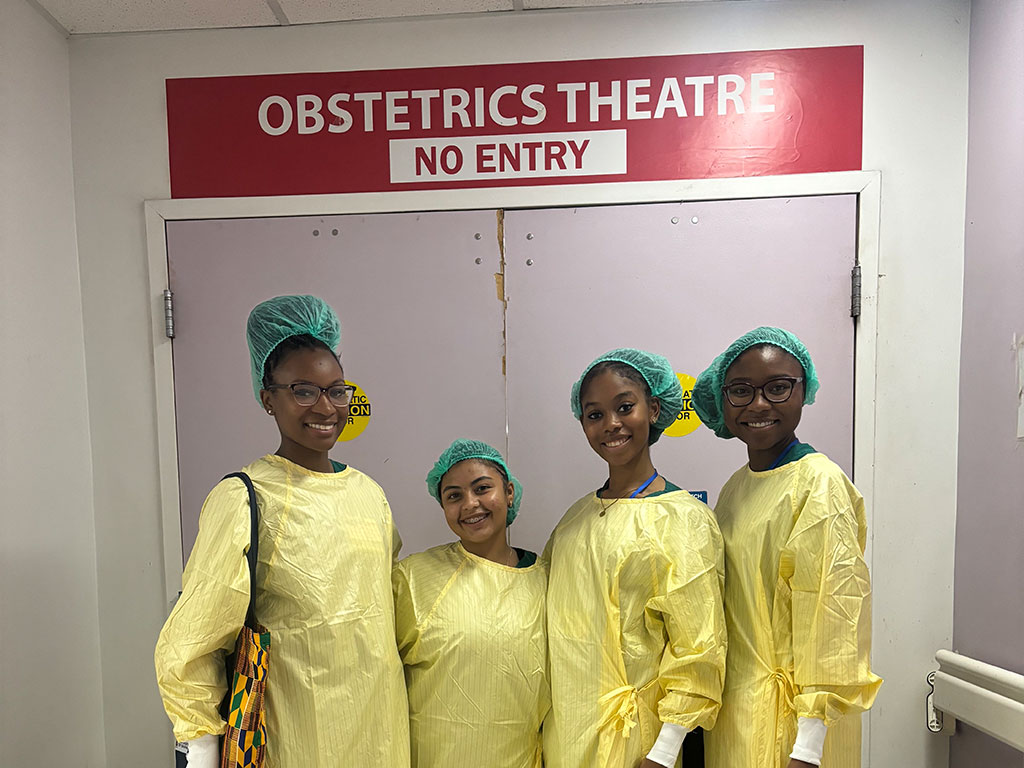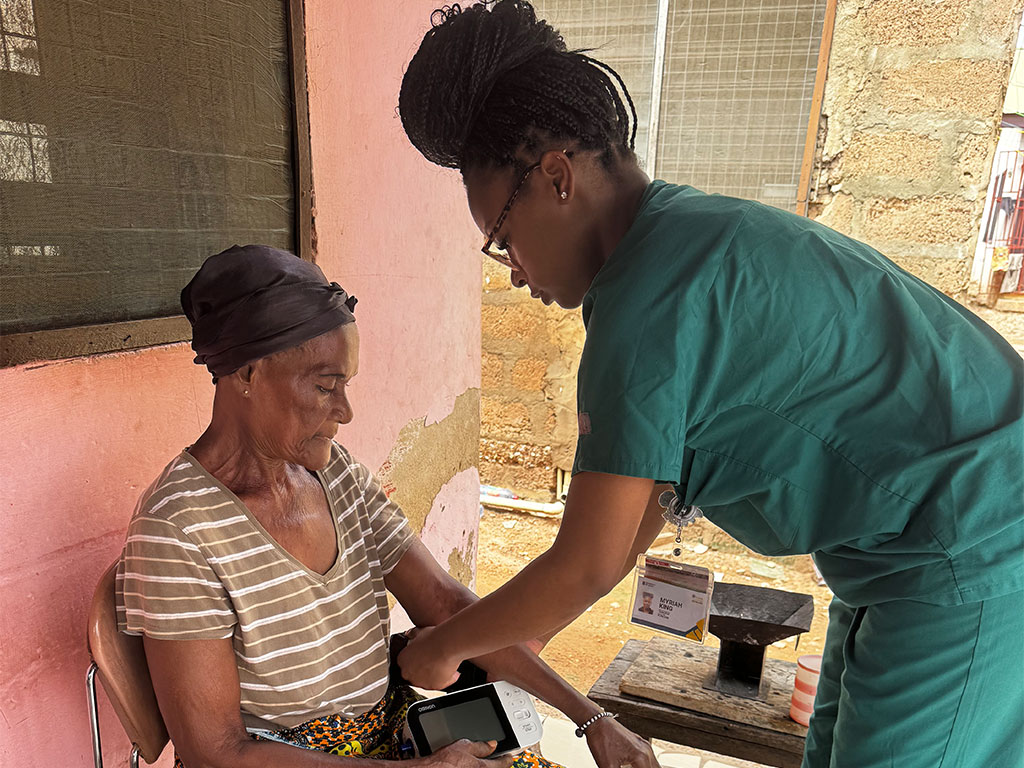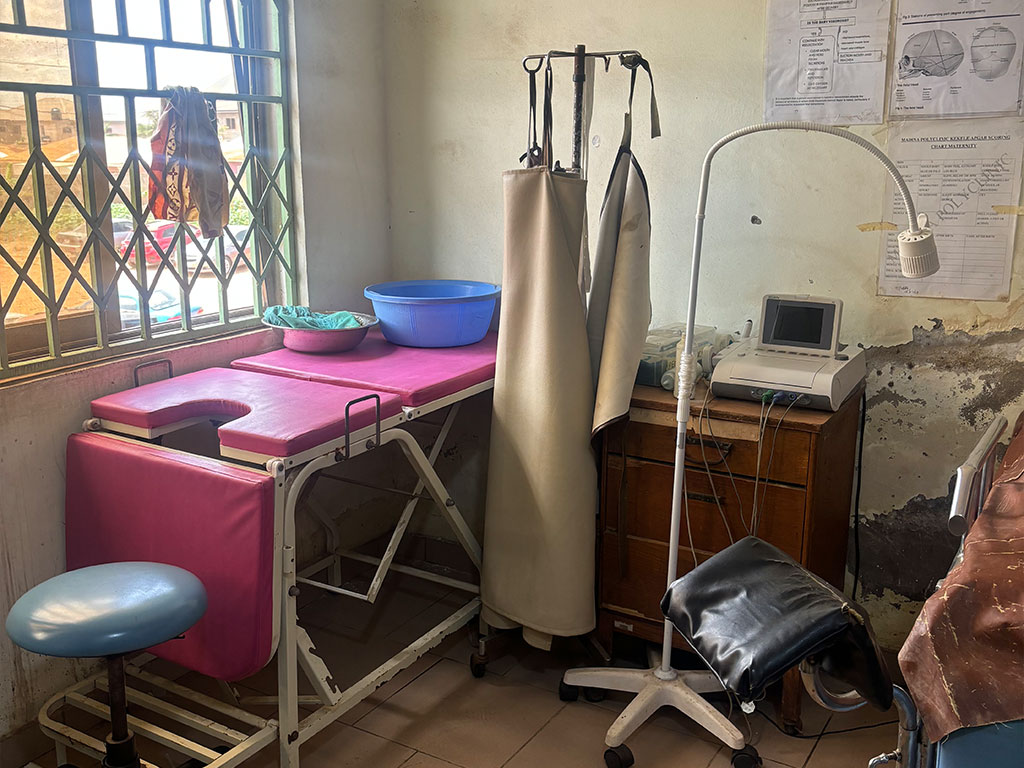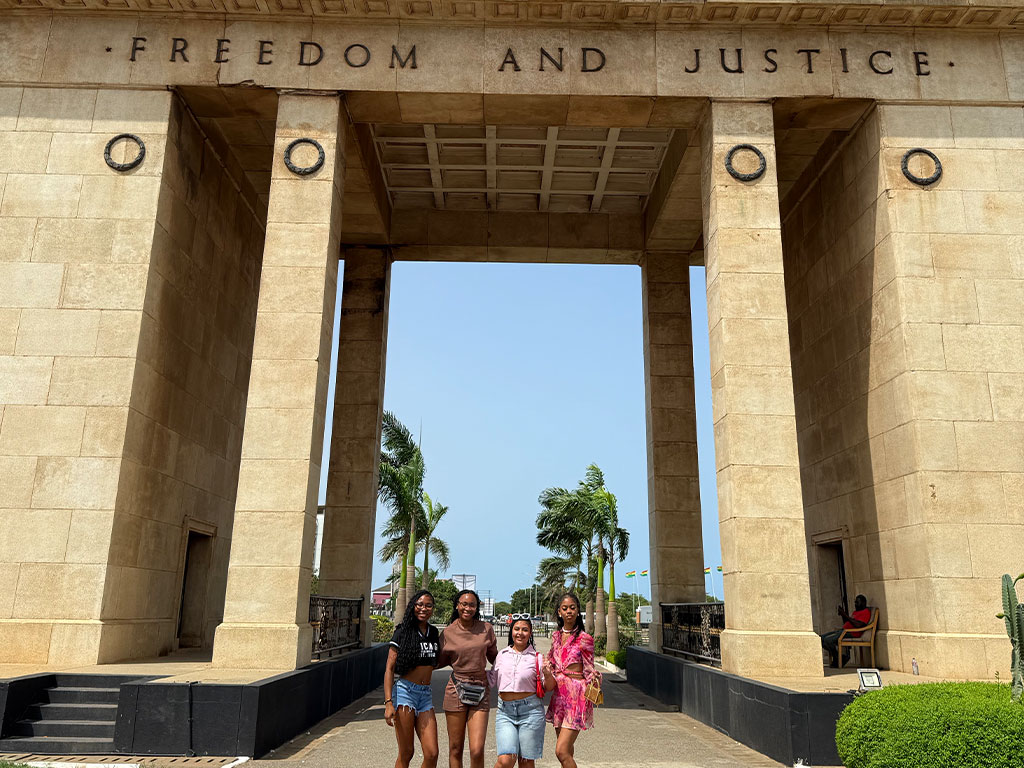Global Care: FAMU Nursing Students Gain Hands-On Experience During Summer Clinicals in Ghana

This summer, a group of dedicated nursing students from Florida Agricultural and Mechanical University (FAMU) ventured beyond the classroom and clinical labs in Tallahassee to the vibrant communities of Ghana, West Africa, for two weeks.
Janelle Baker, Ph.D., associate professor at FAMU’s School of Nursing, emphasized how such international experiences are crucial for preparing nursing students for an increasingly globalized healthcare environment.
“Students face real challenges when working, such as malaria, maternal health issues, and limited healthcare infrastructure in Ghana,” she said. “Our curriculum equips them with a solid foundation in community health, cultural competence, and evidence-based practice.”
Baker said they learn to promote health education tailored to local needs, conduct community assessments, and advocate for equitable healthcare policies.
“This program allows them to become meaningful contributors to health solutions both abroad and at home.”
 FAMU nursing student checks the blood pressure of a local in Ghana, during a summer
clinical where students are prepared to lead in global environments. (Photo special
to FAMU)
FAMU nursing student checks the blood pressure of a local in Ghana, during a summer
clinical where students are prepared to lead in global environments. (Photo special
to FAMU)
A Life-Changing Journey
A Life-Changing Journey
For many students, the trip was not just about clinical practice but about gaining a holistic understanding of healthcare within global contexts.
Fourth-year nursing student Sade Green shared how this experience deepened her commitment to the nursing profession.
“I always wanted to be in healthcare,” she explained. “Originally, I wanted to be a doctor, but watching nurses interact so closely with patients, especially during a time when some members of my family were recovering from a serious accident, inspired me to pursue nursing. Nurses are on the front lines, spending time and forming bonds with patients, and that’s what drew me in.”
Green said that traveling to Ghana expanded her perspective in ways textbooks never could.
“Being in Ghana opened my eyes to the disparities in healthcare and the importance of cultural competence. I learned to treat every patient with respect and optimism because you never truly know what they’re going through, whether it’s their background, finances, or personal struggles.”
Similarly, fellow student Nariah Santiago, a fourth-year nursing scholar, described the program as transformative.
“I’ve always wanted to help people, especially those in need,” Santiago said. “Ghana
showed me a reality far different from what we see here in America-where access to
healthcare is often taken for granted. Nursing school is tough, no doubt, but the
perseverance and skills I’ve gained at FAMU prepared me to adapt and thrive even in
challenging environments like the one in Ghana.”
 An examination room in Ghana. (Photo special to FAMU)
An examination room in Ghana. (Photo special to FAMU)
Bridging Gaps in Healthcare
The impact of cultural differences on healthcare delivery was one of the most impactful things that students learned.
Santiago shared an incident that demonstrated how it affects patient relationships.
“In Ghana, people can be very blunt, which at first seemed rude to me. But I realized it’s just a different way of communicating. For example, a nurse might straightforwardly say a patient is fat while taking their blood pressure,” she said. “Here, we might find that offensive, but there, it’s just an honest observation meant to inform care. That taught me to be more mindful about how I communicate with patients and to always approach with empathy.”
Sade Green agreed, noting, “We’re privileged in America with access to privacy and patient-centered care. But in Ghana, while care is compassionate, expectations are different. Learning to adapt and respect those differences was key.”
Baker further expressed the importance of respecting traditional healing practices.
“We encourage students to engage with local healers and understand indigenous health beliefs without judgment, fostering holistic and sensitive care,” she explained.
Daily Life and Learning Beyond Clinicals
Students said their everyday routine, while in Ghana, was demanding yet enriching.
After clinicals, which typically lasted from 8 a.m. until noon, there were seminars on patient advocacy, safety, and transmissible illnesses. In the afternoons, the students would often explore historical sites, local markets, or simply relax and get ready for the next day.
Santiago recalled visits to places like Cape Coast Castle, a sobering historical site where enslaved Africans were held before being shipped across the Atlantic.
“It was emotional but crucial to understanding the legacy of the African diaspora,” she said. “We also visited museums dedicated to African American figures like W.E.B. Du Bois, and I was surprised and moved by the deep respect Ghanaians have for African American history and culture.”
 FAMU nursing students spent their downtime exploring the corridors of Ghana.
FAMU nursing students spent their downtime exploring the corridors of Ghana.
(Photo special to FAMU)
Preparing Future Nurses for a Globalized World
FAMU’s commitment to service learning and global awareness ensures that students graduate ready to serve diverse communities accordingly.
Baker explained, “Our goal is to develop nurses who are not only clinically skilled but also culturally humble and able to advocate for health equity everywhere.”
Sade Green summed up the experience’s impact:
“I want to do more than just provide care-I want to help educate communities, raise awareness, and make a difference in global health. This trip showed me how important that is.”
As for Santiago, the journey to Ghana ignited a passion for mission work.
“I hope to participate in programs like Nurses Beyond Borders and continue making an impact where the need is greatest.”
For more information on the FAMU School of Nursing, visit their website: https://nursing.famu.edu/
Media Contact:
Rachel James-Terry
Senior Director of Strategic Communications
rachel.jamesterry@famu.edu

